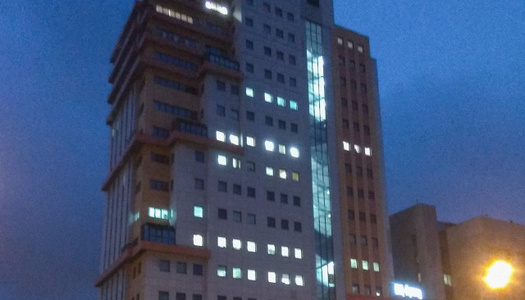
The Russian government’s Internet blacklist is managed by a private company whose main client is the military
Мы рассказываем честно не только про войну. Скачайте приложение.
On April 16, Russia’s federal censor (Roskomnadzor) started blocking the instant messenger Telegram. For technical support, the agency relies largely on a company called “E.Soft,” which has received hundreds of millions of rubles in state contracts to provide its services to Roskomnadzor. It’s possible that E.Soft is directly responsible for implementing the blocking of Telegram. Meduza special correspondent Ivan Golunov learned more about E.Soft, how much it earns from government deals, who owns it, and how the Russian Defense Ministry fits into all this.
The biggest supplier of IT support to Roskomnadzor and its subsidiary the Main Radio Frequency Center (which monitors websites and the mass media and manages the blocking of these resources) is a company called “E.Soft.”
Over the past four years, E.Soft has signed deals with Roskomnadzor worth more than half a billion rubles ($8.2 million), according to the service Kontur Focus. Annually, the company has won a government contract to provide services to expand and support “the ‘hot line’ mode user features of Roskomnadzor’s Unified Information System.” The language in these agreements is vague, and the work is described as “processes of collecting, recording, processing, synthesizing, analyzing, and exchanging information necessary to enforce Roskomnadzor’s authority.” Staff at Roskomnadzor previously told Meduza that the agency uses the Unified Information System to process data about blocked websites.
E.Soft wins most of its contracts with Roskomnadzor automatically through the government’s “single supplier” system. In late February, for example, the Main Radio Frequency Center awarded E.Soft a “technical support” deal worth 40.3 million rubles ($661,725). In some documents, the essence of these contracts is spelled out in greater detail. Earlier this year, for instance, the Frequency Center sought contractors that could develop the functionality of an automated system that can detect online child pornography. The agreement ultimately reached with E.Soft, however, contains no details about any child-pornography detection software.
E.Soft belongs to an ominously named holding company called “Inforser” (Enforcer) whose companies have won more than 7.8 billion rubles ($128.1 million) in state contracts over the past four years. One of the largest businesses in this group — a company named “Femida” (Themis, the Greek personification of divine order) — provides video- and audio-recording services at general jurisdiction court hearings. Russia’s Foreign Affairs Ministry has contracted Inforser businesses to complete a system for manufacturing biometric passports at Russia’s foreign consulates. The holding company also got more than half a billion rubles from Moscow City Hall to develop systems that notify parents when their children arrive at school and when they receive their lunches.
Inforser’s biggest government customer is the Defense Ministry, which paid almost three billion rubles ($49.3 million) to the communications provider “Voentelecom” in 2015. Used by Russia’s armed forces, Voentelecom was hired for “service maintenance.” In the government’s procurement records, there are several other Defense Ministry contracts with Inforser businesses listed for services like “developing an electronic bank for state award recipients” and “finalizing product 83T260.” (It’s unclear what this is.)
The holding company occupies several floors in a business center located in Moscow’s industrial zone on Ryazansky Prospekt. Inforser’s majority shareholders are Igor and Vladislav Kolokov — brothers who both graduated from the Moscow Engineering Physics Institute. Neither Kolokov has ever granted a public interview. A man named Dmitry Bulatov manages the company E.Soft. He also owns the PR agency “Battle Media” (which recently helped rebrand the “Miss Russia” beauty pageant), as well as the online publication TrendyMen, whose newsroom is located at Inforser’s office address.
Story by Ivan Golunov, translation by Kevin Rothrock